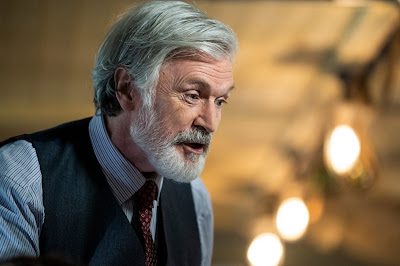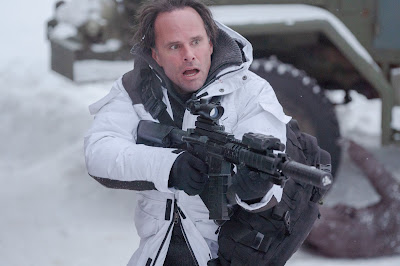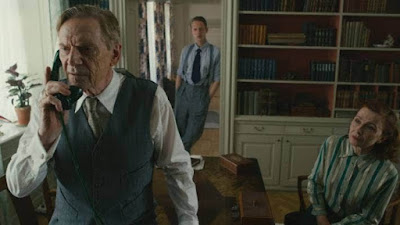A struggling street musician finds himself the target of an animal welfare investigation that threatens to take away his beloved cat at Christmas.
A Christmas Gift From Bob is the sequel to A Street Cat Named Bob, the film adaptation of the popular novelized true story of the same name. Where the original was based on a real story and was faithful to its source material, A Christmas Gift From Bob takes a lot of liberties and carves a new story out of nothing. If we are being totally honest here, it's quite obvious that the story is no longer rooted in truth due to the complete lack of character development and story content.
Bringing back several familiar faces, A Christmas Gift from Bob haphazardly reintroduces everyone with little regard to those who may not have seen the first film or read the book. Luckily, the lack of content in the film also means there is very little to miss. Even without the history and backstory, you can assume where everybody fits into the story.
It's that backstory that is missing, and the factor that will determine whether you will consider this film okay, or something below average. It's the character development of our protagonist that is completely lacking in this sequel and reduces the effectiveness of several scenes where his personality and actions are talked about but never shown. Nothing is worse for the culmination of your emotional final act than your audience not having any context for any of it.
That all being said, A Christmas Gift From Bob still manages to hit all of the cues for suitable emotional manipulation to occur. Whether it be feeling anger towards law enforcement trying to take a beloved pet away from its owner, or the fear and anxiety that comes with a beloved pet getting sick, the fill adequately pulls on the heartstrings or makes the blood boil with ease. Quickly demonstrating who the villains are in the film in the opening scenes, the film is bound to get a response from its audience.
Where the film excels, is in its portrayal of those less fortunate. It looks at those who are poor or homeless and focuses on those little aspects of how minor inconveniences can snowball and become disastrous when you don't have a consistent income. It instils a sense of empathy and sympathy towards those less fortunate and is guaranteed to have more than a few audience members looking at what they can do to help with donations or volunteer work.
This is a small-scale film though. It focuses on the titular ginger cat, Bob, and his owner, and avoids looking at any of the systemic problems or any of the more intriguing twists in the supporting characters' stories. It references how people put spikes on doorways, but the only characters that are shown acting in any way menacingly towards anyone, are the law enforcement agency. Perhaps it is because of the film's need for a clear villain but it avoids going down interesting avenues.
Heartwarming, and likely to invoke sympathy towards those less fortunate, A Christmas Gift From Bob is a Christmas gift for humanity that doesn't make for thrilling viewing, but it certainly still manages to do what it sets out to do; posing as a reminder that giving is more important than receiving, that words can mean more than unnecessary material possessions, and everybody is worthy of basic respect and human decency
A Christmas Gift From Bob is in cinemas from December 3, 2020
Originally posted to: https://djin.nz/Kr8764
















































